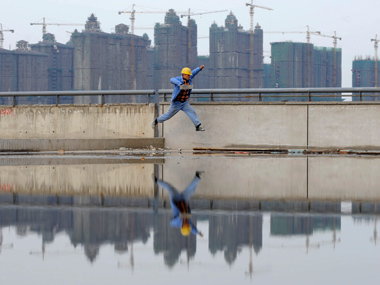When the latest set of data on manufacturing activity around the world came on his screen this week, one word popped up in HSBC economist Frederic Neumann’s mind: decoupling.
That word, which was much bandied about in the immediate aftermath of the 2008 global financial crisis, encapsulated the then-prevalent notion that Asian economies, which had hitherto been dependent on developed economies in the West for much of their growth, had found their feet - and could now grow independent of the West.
That perception of a tectonic shift in the economic power equation between developed and emerging markets led to reams of forward-looking projections about the way of the world. Where once it was famously said that if the US economy catches a cold, the rest of the world would sneeze, Asia had, it was then felt, acquired immunity to infections from faraway lands.
[caption id=“attachment_922031” align=“alignright” width=“380”]  That perception of a tectonic shift in the economic power equation between developed and emerging markets led to reams of forward-looking projections about the way of the world. Reuters[/caption]
Today, however, Neumann says, another kind of ‘decoupling’ is under way, marking an inflection point in the manner in which global economic growth is being sustained. This ‘decoupling’, however, doesn’t represent good news for Asian economies.
That’s because, quite contrary to the narrative from 2008, emerging markets of Asia have hit a rough patch, whereas manufacturing activity data from the developed economies of the world (principally, the US, the UK and the eurozone) are coming in moderately better.
“It is as if emerging Asia is decoupling from better data in the G3 economies,” notes Neumann. “Their growth isn’t sufficient to pull the region along.”
For instance, most PMIs (purchasing managers index) in Asia softened further in June - with the exception of India and Japan, points out Neumann. In India, rising new export orders - presumably helped by a weaker currency - have held things up. But when you look closely, overall new orders contracted last month, and India is therefore “hardly out of the woods yet”, and the plunging currency is proving only a mixed blessing at the moment, he reckons.
The broader pattern of manufacturing activity across Asia validates this sense of an unhappy ‘decoupling’. And HSBC’s lead indicators of manufacturing activity over the next few months suggest things will continue to slow down.
Both of China’s PMIs - the official one that tracks manufacturing activity in the state-owned giants and the HSBC index that tracks private manufacturing - fell in June. Likewise, Korea, Vietnam and Indonesia also lost ground. The only bright spot was Taiwan where the PMI rose by over two points, but even this was partly payback for the plunge in May, points out Neumann.
On the other hand, the G3 developed economies, which were widely given up for good a few years ago, are providing some lift to global growth. In the US, the ISM index of national factory activity has bounced back into positive territory. And although the Markit PMI measure gave back of its recent gains, its new order component nevertheless ticked up. Simultaneously, the eurozone economy is also looking up, despite the drop in the German PMI.
Even the current ‘decoupling’ is only indicative of an inflexion point; it doesn’t quite represent a trend. But just the fact that the economic narrative has turned around 180 degrees is significant.
In fact, the myth of Asia’s “positive decoupling” from the rest of the world had been busted a while ago. Although analysts had been talking up the prospects of such an outcome as late in 2011,contemporaneous commentaries, citing available empirical evidence, had established that the ‘decoupling’ thesis did not enjoy credulity.
As this recent report points out, it was fashionable at one point during the initial stages of the 2008 global financial crisis for studies to ask whether the Asian region had ‘decoupled’ from the US sufficiently to allow it to weather the downward shocks the region was expected to suffere from decreased US demand for its exports as that nation fell into recession.
“Over time, however, the depth of the crisis demonstrated that a sufficiently large adverse shock to demand from the rest of the world could also draw Asia into recession,” it noted.
Of course, to the extent that the developed economies are contributing more to global economic growth when the emerging economies in Asia are in relative decline, it counts as good news. Even if the airplane of global economic growth is running only one engine, for now, it is better than seeing it crashland spectacularly.
But if that engine too starts to die out, the emerging economies of Asia may not be able to fill the breach this time around in the way that they did briefly in the months and years following the 2008 crisis. In that sense, the global economy is today flying in on a wing and a prayer. And ‘decoupling’, once celebrated as the growth mantra, has lost its redemptive power.


)
)
)
)
)
)
)
)
)



